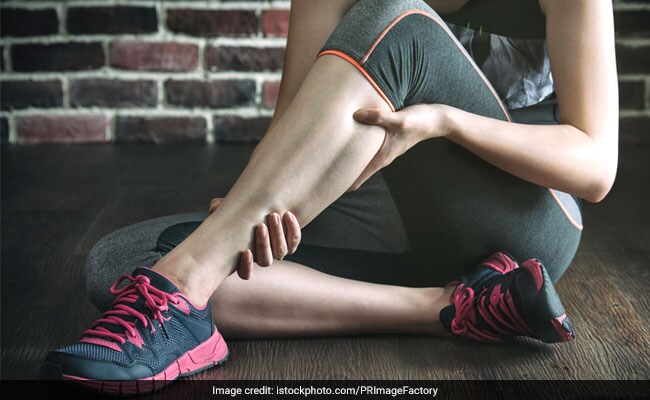Cramps are most often experienced in the legs and feet, particularly, the calf muscles. Though muscle cramps are usually harmless, it makes it impossible to use the affected muscle for a particular period of time.

Cramps are most often experienced in the legs and feet, particularly, the calf muscles.
HIGHLIGHTS
- Muscle cramps can be very painful.
- Eating protein-rich and magnesium related nuts helps in soothing cramps
- Legumes like beans and lentils are packed with proteins and magnesium
After a strenuous workout it is quite normal that one may suffer muscle cramps. Muscle cramps can be very painful. They can last from a few seconds to even longer, say about an hour. A muscle cramp is an involuntarily or forcibly contracted muscle (single or group of muscles) that do not relax. Muscle cramps are more common in adults, but, small children can also experience cramps them. Cramps are most often experienced in the legs and feet, particularly, the calf muscles. Though muscle cramps are usually harmless, it makes it impossible to use the affected muscle for a particular period of time. Muscle cramps may occur even at rest, at night, or during a workout session or even while sleeping.
Muscle cramps are often associated with a poor diet. Regularly incorporating certain foods into your diet can help prevent muscle cramping. The mineral potassium is a vital mineral to prevent cramp prevention. It aids in the communication between muscles and nerves. Other nutrient that can help ease cramp prevention is protein. We all know proteins are great for strengthening muscles and tissue repair.
Also read: Here's Why Stretching Exercises Are So Important For The Muscles
Have a look at some of the healthy foods that help soothe cramps:
1. Water:
Dehydration can also sometimes be the cause of muscle cramps. Ensure that you are fully hydrated. Keep sipping water all day long. This can help contribute to keep cramps at bay. Even other fluids like coconut water and lime water can help keep you hydrated.
2. Banana:
Bananas are an excellent source of potassium, the mineral that helps your body break down carbs and build muscle. Potassium is important for the proper functioning of muscles and nervous system. They also help soothe muscle cramps. Bananas also contain the minerals calcium and magnesium which you are helpful to ease the muscle cramps.
Also read: Luke Coutinho's Exercises To Burn Fat And Keep Muscles Lean And Firm While Travelling
3. Sweet potatoes:
Just like bananas, sweet potatoes are rich in potassium, calcium and magnesium. Even better, they have six times more calcium than bananas. You can even have regular potatoes and pumpkins as they also have these nutrients. In addition they have plenty of water content too which helps you remain hydrated.
4. Legumes:
Legumes like beans and lentils are packed with proteins and magnesium. Legumes like black beans and chickpeas are high in fiber. High-fiber foods can help us ease menstrual cramps as well as control your blood sugar and lower levels and lower cholesterol.

Legumes like beans and lentils are packed with proteins and magnesium.
Photo Credit: iStock
Also read: These 10 Proteins Are A Must If You Want To Gain Muscle Mass
5. Nuts:
Eating protein-rich and magnesium related nuts helps in soothing cramps. Although nuts are not a complete protein as they lack some essential amino acids. Feeling weak, cramps and muscle twitches are usually caused because of magnesium deficiency. Increase your magnesium intake by eating beans and legumes, nuts and seeds, whole grains, bananas and dark, leafy greens.
Disclaimer: This content including advice provides generic information only. It is in no way a substitute for qualified medical opinion. Always consult a specialist or your own doctor for more information. NDTV does not claim responsibility for this information.
DoctorNDTV is the one stop site for all your health needs providing the most credible health information, health news and tips with expert advice on healthy living, diet plans, informative videos etc. You can get the most relevant and accurate info you need about health problems like diabetes, cancer, pregnancy, HIV and AIDS, weight loss and many other lifestyle diseases. We have a panel of over 350 experts who help us develop content by giving their valuable inputs and bringing to us the latest in the world of healthcare.














